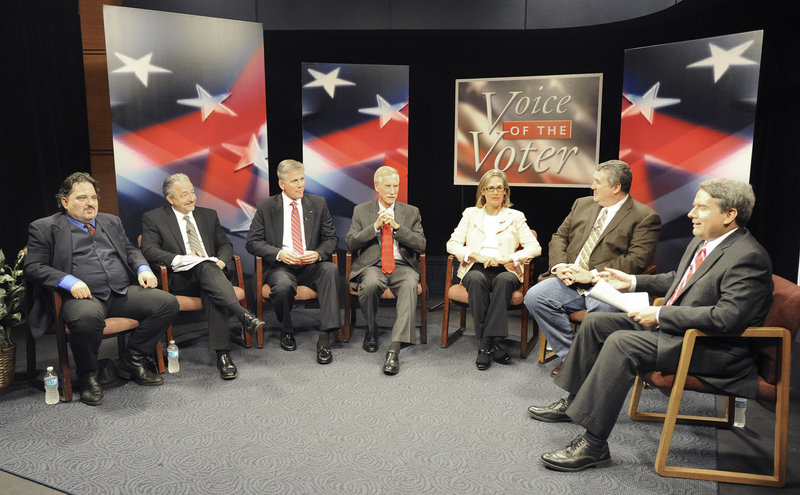The six candidates for Maine’s open U.S. Senate seat engaged in a debate Monday befitting the raging weather but not reflecting a race that appears to be settling.
The WCSH-TV debate, the first televised contest of the campaign, featured plenty of exchanges, but was held amid reports that national groups are beginning to withdraw after spending nearly $7 million for television and radio ads.
Many of those ads have been directed at the front-runner, former independent Gov. Angus King, and his Republican rival, Secretary of State Charlie Summers.
The two have engaged in several verbal jousts in non-televised debates. It happened again on Monday, but the barbs were at times upstaged by a range of questions, some regarding a delicate topic for Summers: his strained relationship with his former boss, U.S. Sen. Olympia Snowe.
Pat Callaghan, the WCSH news anchor, opened the debate with pointed questions for Summers, who did not endorse Snowe when she faced a tea party challenger last year.
Snowe has backed Summers verbally, but not financially, a point that Callaghan underscored.
Callaghan, hinting that Summers was disloyal, asked him how voters could be assured that he would support them when he couldn’t back the woman who had employed him for nine years and bolstered his political career.
Summers professed his allegiance to Snowe, adding that she had co-sponsored a fundraiser for his campaign in Washington, D.C.
Snowe was in Maine at the time of the fundraiser, which was hosted by Republican leaders. Callaghan noted her absence and again asked if people could trust Summers.
“Is there a trust issue there?” Callaghan asked. “Can voters trust you?”
“Absolutely,” Summers said.
Later in the debate, independent candidate Steve Woods hit Summers on the Snowe issue. Summers, growing frustrated, said, “I don’t think Maine voters are interested in playground rumors.”
Callaghan also asked pointed questions of the Democratic candidate, Cynthia Dill, who has tried to portray King and Summers as wealthy white men who are benefiting from a broken political system.
Callaghan asked Dill if voters should elect a candidate based on gender. Dill said the Senate should reflect the electorate, which includes women.
“I have nothing against rich, older white men,” she said. “I just happen to think they’re already well represented in the U.S. Senate.”
The candidates also discussed issues including health care, taxes and government spending.
They offered a range of answers when asked if government should invest in research and development.
Andrew Ian Dodge, a former tea party activist who is now running as an independent, said the government should be focusing on reducing the national debt.
Dodge’s response was contrasted by Dill and King, who both support government investments in research and development. King touted his support for state research spending during his two terms as governor. Before then, he said, Maine was last in the country in such investment.
Summers said he supports “targeted” investment but wasn’t specific about where government should direct funding.
Instead, he attempted to parlay the question into an attack that he and Republicans have frequently deployed against King: his investment in wind energy.
King didn’t respond at the time, but he did when Summers revisited the issue during a segment of the debate that allowed each candidate to ask another a question.
Summers again questioned King about a $120 million federal loan guarantee that King’s former company received for the 22-turbine wind power project in Roxbury. Summers said the project resulted in clear-cut mountaintops and discord among residents.
King noted that the project reduced property taxes by 59 percent and provided Roxbury residents with free power. He said the wind farm was particularly productive on Monday as Hurricane Sandy passed through Maine.
He said government investments in energy are important and the country will never achieve energy independence and clean air “if we don’t stop burning stuff.”
Dill tried to corner King on which party he would caucus with in the Senate. She prefaced her question by noting controversial comments about abortion and rape by two Republican Senate candidates outside Maine and a party platform that would limit a woman’s right to choose.
King, interrupting Dill, asked her if she should be directing her question to “this guy,” gesturing to Summers.
King, who is pro-choice, repeated his standard answer to the caucus question, saying he is in the race as an independent and hopes to remain that way for as long as he can.
King later asked Summers how he plans to reduce the national debt, adding that the Republican has offered few specifics except that he would eliminate the U.S. Department of Education, which accounts for only a fraction of the deficit.
Summers didn’t bite, saying only that he would review “every department.” He also defended his plan to eliminate the Department of Education, which is “a bureaucracy that soaks up federal dollars.”
The debate was one of the few in which all six candidates participated. Three of the independents, Dodge, Woods and Danny Dalton, touched on a number of issues.
Dalton, a former Drug Enforcement Administration agent, focused on ineffective government initiatives, such as the war on drugs. Dalton said authorities should focus on hard-drug enforcement but decriminalize marijuana.
Later, Dodge and Woods took turns going after Summers.
Woods, who has many of the same policy views as King, chided Summers for assigning all of Maine’s problems to the former governor, adding that he fully expected the Summers campaign to blame King for the “low barometric pressure” that was contributing to the storm raging outside.
Staff Writer Steve Mistler can be contacted at 791-6345 or at:
smistler@pressherald.com
Send questions/comments to the editors.


